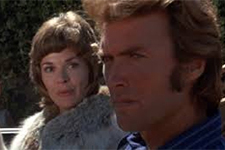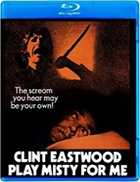Play Misty for Me
|  Clint Eastwood began his acting career playing bit roles on various television series in the 1950s before establishing himself as a regular presence on the long-running TV oater Rawhide (1959–65) and then achieving international stardom playing the stoic Man With No Name in Sergio Leone’s spaghetti western triptych A Fistful of Dollars (1964), For a Few Dollars More (1965), and The Good, the Bad, and the Ugly (1966). Thus, it is somewhat surprising that, when Clint Eastwood moved behind the camera, it was not to direct a western, but rather Play Misty for Me, a tense psycho-thriller that manages to both lionize and undercut his well-established screen machismo. However, now that we have the benefit of assessing the entirety of Eastwood’s output as a director over the past 50 years, it is actually not much of a surprise, as he has defined his career behind the camera primarily in terms of diversity, having helmed romances, comedies, action films, war films, historical epics, and, yes, more than a few westerns. So, even though Play Misty for Me seemed like an anomaly at the time, it was really a harbinger of things to come. The film’s title comes from the recurring phone call a Carmel, California, DJ named Dave Garver (Eastwood) receives every evening from a breathy female fan requesting that he play jazz pianist Erroll Garner’s titular ballad. Dave programs the late-night show at the radio station, mixing smooth jazz with poetry readings, and that on-air persona so attracts the woman on the phone that she orchestrates a meeting with him at the bar he frequents after work (where the bartender is played by Don Siegel, who had directed Eastwood in his previous four films and was his directorial mentor). The woman, Evelyn (Jessica Walter), is quite forward in her pursuit of Dave, but there is nothing overtly threatening about her—at least, not initially. Dave has a long sexual history and isn’t looking for anything more than a no-strings-attached one-night stand, but Evelyn clearly has other intentions. Her preliminary intrusions into his life might be written off as minor inconveniences from an overenthusiastic sexual partner, but then we see the quick flashes of anger, the mercurial temperament, the increasing possessiveness and disassociation from reality. Dave tries to be “straight” with her, but there is no point because they have a relationship that exists entirely within her head in which he is hers and she is his and they love each deeply. To say that things don’t go well from there would be an understatement, especially when Dave officially breaks things off and Evelyn turns her energy to wild-eyed hysterics accompanied by sharp instruments. At its core, Play Misty for Me is a cautionary tale for the era of increasing sexual permissiveness, a tune that would be struck with slight variations in numerous other films, including Looking for Mr. Goodbar (1977) and, of course, Fatal Attraction (1987), which takes more than a few narrative cues from Misty. Unlike Michael Douglas’s cheating husband and father in that film, Dave is a single man playing the field, something about which he is honest and upfront. However, he is hardly a man of great honor, as we soon learn that he has an ex-girlfriend named Tobie (Donna Mills), an artist who is back in town after having left to get away from him and his cheating ways. Tobie is essentially the “good girl,” the one to whom Dave is drawn despite his difficulties with monogamy, which is, of course, just the thing to really send Evelyn over the edge. There are echoes of Alfred Hitchcock’s Psycho (1960), which had come out 10 years earlier and turned the horror genre on its head with its portrait of a deeply divided protagonist driven to murderous rage by the jealous mother he had internalized. Evelyn is Mother Bates as lover rather than maternal figure, desperately trying to hold onto Dave and the illusory relationship she has created with him. Having come out in the midst of second wave feminism, it is tempting to read Play Misty for Me as anti-feminist blowback, with its portrait of a single, sexually assertive woman as a domineering psychopath. But, such a reading fails to take into account both the genre dictates and Eastwood’s portrayal of Dave as a man whose moral failings have left a path of heartbreak and emotional destruction. He appears to be trying to be a better man in reuniting with Tobie, but we can’t quite shake the notion that he will, at some point, revert to his old ways. Thus, Dave is, if anything, a mess of contradictions, some of which may have played out subconsciously as Eastwood tried to negotiate the difficult terrain of both playing and directing a character who, on the surface, is full of traditional masculine bravado (even if he likes to quote poetry), but who spends much of the film being a victim—or at least is at risk of being one. (Film scholars have had a field day for decades digging into the gendered and sexual motifs in his enormous body of Eastwood’s work, often finding that, despite his hard-edged political persona, he prefers to deal in complexity, contradiction, and equivocation when it comes to masculinity.) As a first-time director, Eastwood proves himself to be fully competent (his speed and efficiency have been hallmarks of his artistry, and he demonstrated it here by coming in underbudget and ahead of schedule), with a dash of daring. He incorporates a number of the aesthetic flourishes that had been seeping into mainstream American cinema from the various European new waves of the ’50s and ’60s. He is deeply in love with the zoom lens and uses it frequently, and he often stages sequences to highlight the setting, whether it be Dave’s modernist abode that is open in the middle to the rugged terrain on which it is built, the craggy seaside that promises much tumult and violence, or the idyllic meadows and waterfalls that form the backdrop for Dave and Tobie’s reunion. Yet, at the same time, he displays a powerful intuition for when to use close-ups, and his framings of Dave and Evelyn early in their relationship underscores both her insipient menace and his overconfident naivete. Eastwood and Walter play off each other quite well; he is understated without being dull, while she chews just enough scenery to create a genuine sense of unhinged malice without becoming a cartoon. The film suffers some pacing issues, and Eastwood does make some inscrutable choices, such as lingering unnecessarily in a scene in which Dave and Tobie attend the Monterey Jazz Festival. But, otherwise, Play Misty for Me is a fine thriller that gives us plenty to chew on after the credits have rolled.
Copyright © 2020 James Kendrick Thoughts? E-mail James Kendrick All images copyright © Kino Lorber | |||||||||||||||||||||||||||||
Overall Rating: 

 (3)
(3)


